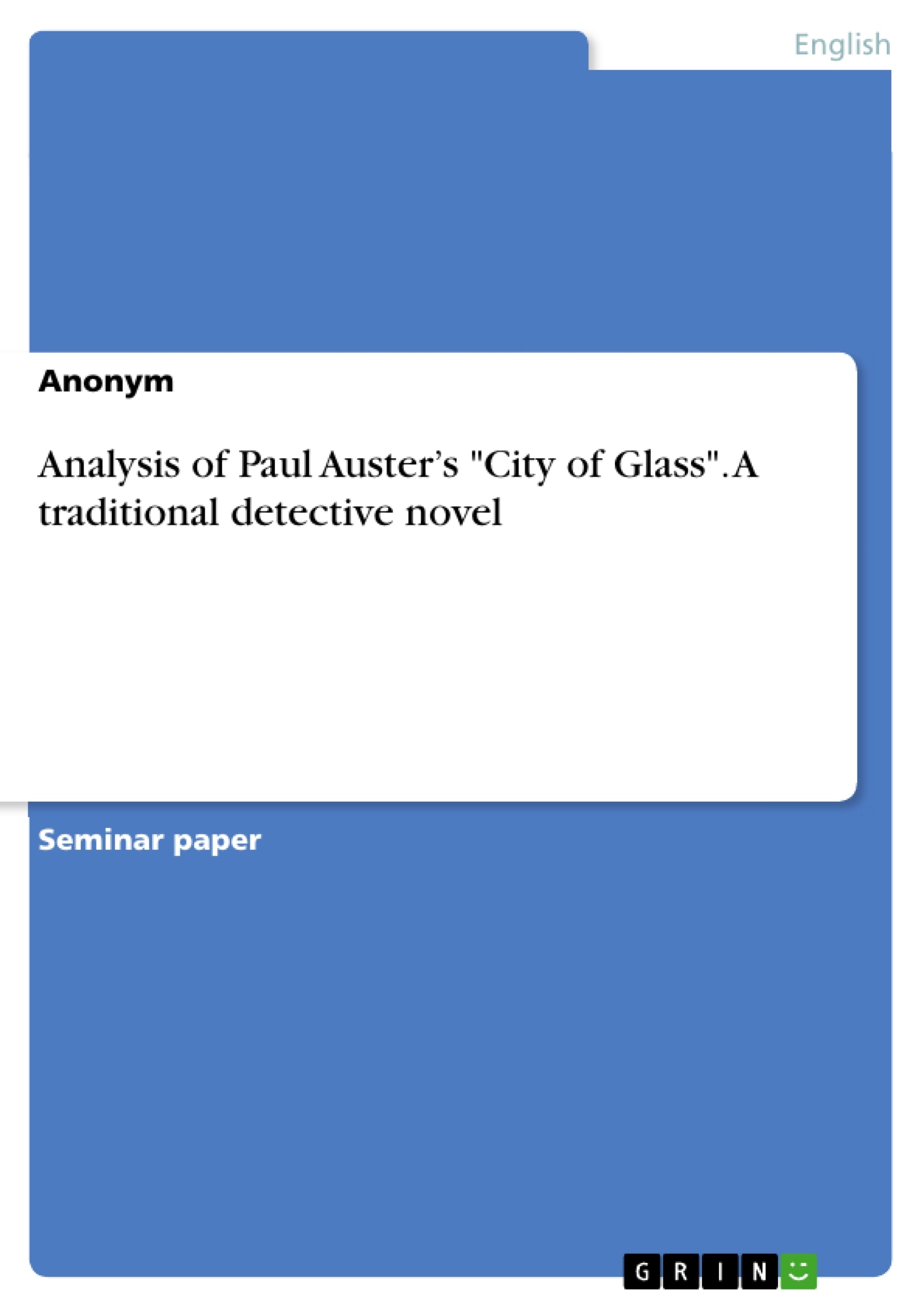In this term paper, Paul Auster’s “City of Glass” is going to be analyzed from a psychoanalytical point of view to explore the protagonist's development. The main question of this paper is: Is “City of Glass” a traditional detective novel? The term paper is divided into the Lacanian theory, the development of Daniel Quinn and the development of the detective novel. The paper will focus on the protagonist and analyze his behavior, his inner life, the process of his search for identity and identity formation. The emphasis lies in how Paul Auster places the protagonist, Daniel Quinn, in connection with a traditional detective novel.
The question of identity and individuality is a significant subject in Paul Auster’s books. In each short story of the New York Trilogy, every protagonist represents the role of a detective. They are positioned in these specific situations which are inexplicable and beyond comprehension.
To answer the question of identity, Jacques Lacan’s theory of psychoanalysis is used to analyze Daniel Quinn’s character. The first detective novel is credited to Edgar Allan Poe with his short story “The Murders in Rue Morgue”, written in 1841. Poe is the so-called father of the detective genre. He paved the way for the next century and the coming authors such as Sir Arthur Conan Doyle, Charles Dickens, and Raymond Chandler.
Table of Contents
- Introduction.
- Jacques Lacan's theory
- The Symbolic.
- The Imaginary.
- The Real.
- Development of Daniel Quinn
- Quinn's multiple identities..
- Quinn and the detective world.
- Quinn's loss of control.
- City of Glass - a traditional detective novel?.
- Conclusion........
Objectives and Key Themes
This term paper analyzes Paul Auster's "City of Glass" from a psychoanalytical perspective, focusing on the protagonist's development and exploring the question of whether the novel is a traditional detective novel. The paper examines the concept of identity and individuality within the context of Auster's work, specifically through the lens of Jacques Lacan's theory of psychoanalysis.
- The role of identity and individuality in Paul Auster's writing.
- The impact of Jacques Lacan's theory of psychoanalysis on understanding character development.
- The relationship between Daniel Quinn's character and the conventions of the traditional detective novel.
- The exploration of the Symbolic, Imaginary, and Real in shaping Quinn's identity.
- The implications of Quinn's psychological journey for understanding the nature of the detective genre.
Chapter Summaries
- Introduction: This chapter introduces the central focus of the term paper: an analysis of Paul Auster's "City of Glass" through a psychoanalytical lens, specifically examining the protagonist's development and the question of whether the novel is a traditional detective novel. The chapter also highlights the significance of identity and individuality in Auster's work and introduces the use of Jacques Lacan's theory of psychoanalysis to explore these themes.
- Jacques Lacan's theory: This chapter presents an overview of Lacan's psychoanalytical theory, which divides the psychic spheres into three parts: the Imaginary, the Symbolic, and the Real. The chapter explores the relationship between these three spheres and their role in the formation of human identity and experience.
- Development of Daniel Quinn: This chapter analyzes the protagonist's psychological development using Lacan's theoretical framework. It focuses on Quinn's multiple identities, his involvement in the detective world, and his eventual loss of control.
Keywords
The central focus of this term paper revolves around the concepts of identity, individuality, psychoanalysis, detective fiction, and the application of Jacques Lacan's theory to understand the development of Daniel Quinn's character in "City of Glass." The term paper also examines the relationship between Quinn's psychological journey and the conventions of the traditional detective novel, drawing on the theoretical frameworks of both Lacan and established detective fiction scholarship.
Frequently Asked Questions
Is Paul Auster’s "City of Glass" a traditional detective novel?
The paper explores this question by comparing the novel's structure and its protagonist, Daniel Quinn, to the conventions of the traditional detective genre established by authors like Edgar Allan Poe.
How is Jacques Lacan’s psychoanalytic theory applied in the analysis?
The study uses Lacan's concepts of the Symbolic, the Imaginary, and the Real to analyze Daniel Quinn’s search for identity and his eventual psychological breakdown.
What are the key themes of "City of Glass" discussed in this paper?
Central themes include identity formation, individuality, the inexplicable nature of reality, and the role of the detective as a representative of the self.
Who is Daniel Quinn in the context of the New York Trilogy?
Daniel Quinn is the protagonist of the first story, who takes on multiple identities and finds himself in a situation that challenges his perception of control and self.
What role does Edgar Allan Poe play in the paper's argument?
Poe is recognized as the "father" of the detective genre, providing the traditional framework against which Auster’s postmodern approach is measured.
Does the protagonist achieve identity formation?
The paper analyzes Quinn's process of identity formation, noting his loss of control and the fragmentation of his personality throughout the narrative.
- Quote paper
- Anonym (Author), 2016, Analysis of Paul Auster’s "City of Glass". A traditional detective novel, Munich, GRIN Verlag, https://www.grin.com/document/372034



